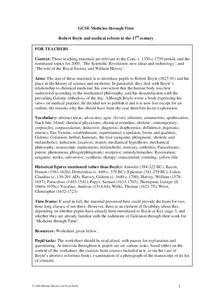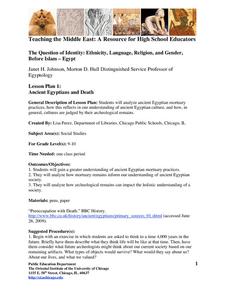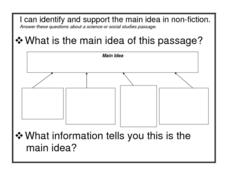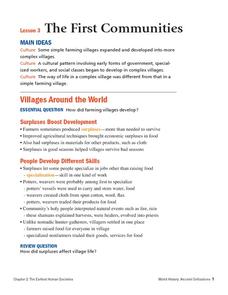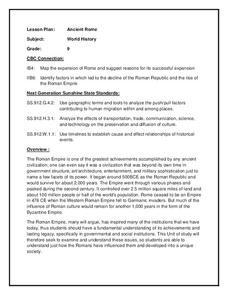Cuban Revolution
The Cuban Revolution and Its Impact on Latin America
Fidel Castro was the iconic leader of Cuba. Yet, individuals may know little about the man or his motivations. In an engaging Web quest activity, scholars investigate Castro's political aspirations and his more ephemeral personal life...
Cornell College
Dred Scott v. Sandford Supreme Court Decision
Dred Scott was a harbinger of the Civil War. An enslaved man claimed freedom because his owner had taken him into free territory. Not only did the Supreme Court rule that Dred Scott and his wife were to remain enslaved, but it also ruled...
American Psychological Association
Developing Adolescents
Why to young people act the way they do? Scholars investigate the stages of adolescent development incorporating high school psychology techniques. Using research from the American Psychological Association, they uncover the five areas...
American Psychological Association
How Psychology Benefits Society
How do people form their opinions about certain social issues? Scholars research current global issues to find out how psychology plays a role in swaying thoughts. Using blogs, writings, and presentations, they uncover why people think...
Student Handouts
Guy Fawkes Night
What happened on the fifth of November that has prompted an annual, national commemoration in Great Britain? Young historians look at a traditional English rhyme and folk tale from the seventeenth century that describes the failed...
Michael Hunter and Fiona Kisby
Robert Boyle and Medical Reform in the 17th Century
Introduce pupils to the work of Robert Boyle and his influence on medical practice through a series of informational texts and discussion questions.
University of Chicago
Ancient Egyptians and Death
What archaeological evidence remains of ancient Egyptian burial and mortuary practices, and what can this information tell us about ancient Egyptian society?
Curated OER
How was the Constitution Used to Organize the New Government?
How did the United States Congress determine how the new president and vice president would be named when the nation was first established? Who would provide money for the government, and how would the executive branch be organized?
Center for Civic Education
Responsibility and the U.S. Constitution
When are responsibilities freely chosen, and when have they actually been imposed on us? Here you'll find a unique way to frame your class discussion on civic duty and responsibilities inherent in the United States Constitution.
Polk Bros Foundation
Analyze History
Determining the central idea of a historical event or theme involves identifying key points of information, such as the people and place involved in the history, challenges faced, and choices made. Your young historians can use this...
Polk Bros Foundation
Topic Report Learning Organizer
If you'd like to quickly access a simple graphic organizer designed for a class to divide and conquer a larger subject, then check out this resource. Assign class members to study a specific topic within a historical theme or event, and...
Polk Bros Foundation
I Can Identify and Support the Main Idea in Non-Ficiton
Analyze a historical or scientific informational text by determining the main idea and supporting details. This graphic organizer allows pupils to write down the main idea and four details.
Houghton Mifflin Harcourt
The First Communities
These documents list essential questions and foundational concepts associated with early civilizations and farming communities in the agricultural revolution. Use this as a starting point for developing specific lessons and activities...
Curated OER
Centers of the Storm: The Lyceum and the Circle at the University of Mississippi
Greek Revival architecture and the Civil Rights Movement? Sure! Examine how the Lyceum and Circle, two historic buildings located on the campus of the University of Mississippi, relate to integration and the 1962 riot on the university...
Miama-Dade County Public Schools
Ancient Rome
This resource outlines several general activities for a study of Ancient Rome, and includes guiding questions, a handout on the story of Romulus and Remus, and ideas for incorporating mapping and timeline activities into your review.
Houghton Mifflin Harcourt
Renaissance and Reformation Chapter Test
This simple textbook assessment begins with a series of five short answer questions on major ideas from the Renaissance and Reformation. Then, young historians use their knowledge of artistic styles and developments from the period to...
Houghton Mifflin Harcourt
Renaissance and Reformation Test Preparation
This multiple-choice assessment on the Renaissance and Reformation reviews topics from humanism and the protests of Martin Luther to Italian city-states. While this is a traditional assessment designed by a textbook publisher, you can...
Curated OER
The Spread of Enlightenment Ideas
Looking for a simple and straightforward reference on the Enlightenment for your young historians? Check out this list of key terms and important figures from the period, followed by a traditional assessment where your learners will be...
National Park Service
Freedom at Antietam
Explore how the issuance of the Emancipation Proclamation affected everyday individuals in the Civil War era. Learners are given the opportunity to read and evaluate primary and secondary source material, and then to compose a writing...
National Endowment for the Humanities
The Debate in the United States over the League of Nations: Five Camps: From Voices of Consent to Voices of Dissent
Students explore and discuss Woodrow Wilson's concepts for peace and the League of Nations. They understand efforts made to foster American support for the League and discuss the opposition shown in the Senate.
Curated OER
Cartoons for the Classroom: A Parody of Broken Promises
Parodies of political figures are the lifeblood of the editorial cartoons in a free press. North Korea's nuclear threat provides young political scientists an opportunity to hone their critical thinking skills as they analyze a cartoon...
National Endowment for the Humanities
Slavery and the American Founding: The "Inconsistency Not to Be Excused"
High schoolers examine slavery in the revolutionary and colonial eras of the United States. In this slavery lesson, students investigate the presence of slavery in early America, the language of the Constitution, and the intent of the...
National Endowment for the Humanities
Lesson 3: Religion and the Fight for American Independence
Pupils explore the role religion played in the American Revolutionary War. Using primary documents and writing exercises, students understand how religion was used in support of the war efforts and how specific religious groups responded...
National Endowment for the Humanities
Lesson 2: The Debate in Congress on the Sedition Act
Pupils research and discuss the provisions in the Constitution that supported the arguments for and against the Sedition Act. They articulate objections to and arguments in favor of the Sedition Act.







